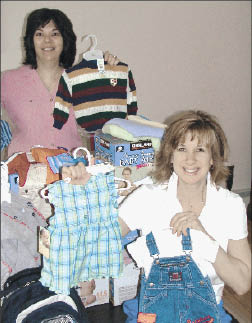 |
|
Best Dressed: Volunteers from a congregation display donations from a clothing drive for youth. Photo: Covenant to Care for Children |
Bloomfield, Conn.
(860) 243-1806,
http://www.covenanttocare.org
Objective: Helping child protection workers meet the needs of abused and neglected children.
In a Nutshell: Adopt a Social Worker (AASW) matches volunteers from church congregations with social workers in the state of Connecticut; the vast majority are child protection workers from the Department of Children and Families (DCF). The congregations use their own household supplies or orchestrate drives to fulfill many of the basic needs of DCF children and their families, such as clothes, bed supplies, diapers, books and toys. The social workers also participate in AASW on a volunteer basis; although DCF helps fund the program, it does not facilitate partnerships. Covenant to Care for Children does not work with every social worker who applies to volunteer. “They have to have their heart deep into the work; not cynical, not out just for a paycheck,” says CCC Executive Director Caryl Hallberg. Coordinators make the judgment call on which social workers are accepted.
Where and When it Happens: Volunteers are recruited from faith-based groups around the state, and remain in contact with DCF workers year-round.
Who Started it and Who Runs It: AASW was the core project that evolved three years after CCC, a nonprofit, was founded in 1987 to help abused, neglected and at-risk children and youth. “The state of Connecticut has a desperate, ignored population of children who do not have the basic resources to be healthy or succeed in school or life,” Hallberg says. “We saw a means of mobilizing and channeling those resources through caring and faithful people.”
The AASW program is managed by Hallberg and regional coordinators Megan Cardinal, Meral Prewitt and Judith Chewning.
Overcoming Obstacles: Building the relationships between the DCF social workers and AASW’s partners was the first hurdle. “Matching the right social worker with the right [faith-based organization] is a little like a dating service,” Hallberg says. “We want the personalities and needs vs. resources to be a fit.”
Cost: AASW uses $308,000 of CCC’s operating budget, which is slightly under $1 million. In addition to the AASW program, CCC operates the Critical Goods Distribution Program, a mentoring program, the Child Enrichment Fund and an emergency food pantry. “Most of it is salary,” Hallberg says of AASW’s operating costs.
Who Pays: AASW is funded by a contract with DCF, which pays for about two-thirds of the program’s cost, with additional support from individual and corporate donations.
Youth Served: Any child from infancy to 18 years old who is being supervised by a selected DCF social worker. CCC’s most recent annual report states that in 2006, AASW paired 230 congregations with 213 social workers, and that at least 19,740 children were provided with goods.
Research Shows: A research study of CCC in the fall of 2001 by St. Joseph College, in West Hartford, Conn., looked at the impact of AASW and Covenant’s Critical Goods Distribution Program. It found that Covenant’s assistance had helped to prevent the removal from their homes of more than 1,800 children.
What Still Gets in the Way: A need to develop youth leadership for AASW among the congregations. “Our faith-based organizational partners desperately need youth and young adult leadership,” Hallberg says. “We need [youth] ready to step up and help the organization into future prosperity.”

























